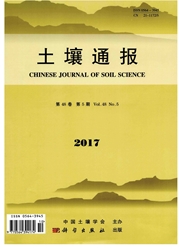

 中文摘要:
中文摘要:
大量有机物料投入下的雷竹强度经营方式下,了解其土壤有机质的转化有一定的现实意义。本研究采集分析了不同种植年限下雷竹林土壤的有机质,用13C核磁共振方法分析有机质组成,并通过分解培养试验了解土壤有机质的稳定状况。结果表明,雷竹种植初期土壤有机质较对照稻田有明显下降,但在覆盖经营后则极大地提高了土壤有机质含量,每年每亩表层有机质增加达到616 kg,占投入物料的23.8%;核磁共振分析及分解试验表明土壤增加的有机质其稳定性也有所提高,说明雷竹林经营中有机质可被有效固定,在土壤固碳方面具有一定的意义。
 英文摘要:
英文摘要:
It is important to understand soil organic matter status in Lei bamboo with a large organic material input.In this study,soil samples from Lei bamboo field with different planting times were collected.Through 13C NMR analysis and a decomposition incubation experiment,the composition and stability of soil organic matter were discussed.Results showed that soil organic matter content decreased in the early stage when the paddy field shifted to Lei bamboo.However,the content of soil organic matter increased greatly after the field using the organic material mulching technique.The increased part of soil organic matter accounted 23.8% for the input.NMR and decomposition results suggested the stability of increased organic matter was high,indicating that soil organic matter could be stabilized in Lei bamboo field with the intensive management and it is useful for carbon fixation.
 同期刊论文项目
同期刊论文项目
 同项目期刊论文
同项目期刊论文
 Model estimation of ammonia volatilization from a paddy rice field after application of a surface fi
Model estimation of ammonia volatilization from a paddy rice field after application of a surface fi Iron and aluminum forms of the soil in Moso-bamboo stands under the extensive and integrated culture
Iron and aluminum forms of the soil in Moso-bamboo stands under the extensive and integrated culture Changes of soil aluminum form after a bamboo planted on a paddy soil soil with an intensive manageme
Changes of soil aluminum form after a bamboo planted on a paddy soil soil with an intensive manageme 期刊信息
期刊信息
